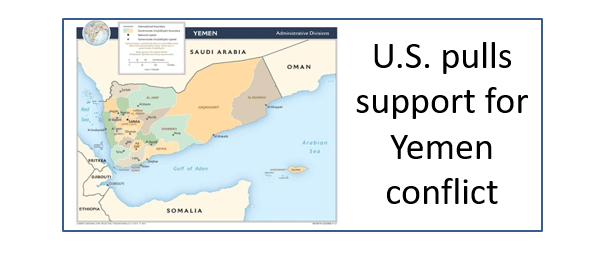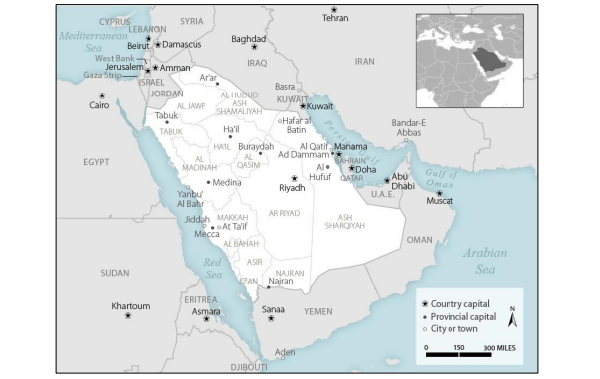
The Biden administration wasted very little time in setting a course correction in the United States role in the Yemen conflict. Citing humanitarian issues (as well as other concerns) it has decided to eliminate support for offensive operations provided to Saudi Arabia and the United Arab Emirates in their fight against the Iran-supported Ansarallah / Houthi rebels in Yemen. The conflict has raged for many years.
Humanitarian Crisis. The Yemen conflict has resulted in a humanitarian crisis – which the United Nations says is one of the worst in the world. There are widespread food shortages resulting in malnutrition. The economy is in a shambles and government services are operating in a very basic level. The aerial bombardment by Saudi and UAE aircraft has resulted in numerous civilian casualties. There is a significant lack of medical supplies and services for the civilian population. In addition, the COVID-19 pandemic and cholera are taking a toll among the population.
The Houthis. With a strong base in the north region of Yemen the Shia group has attempted to extend its reach south and east throughout the country. It controls the capital city (Sanaa). Other religious, ethnic, and political groups have joined their movement. Most of the civilian population (estimates vary from 70 to 80%) come under Houthi control. The Houthis enjoy a strong position in the conflict – with no sign of their impending defeat in the future.
Iranian Support. The Houthi rebels have been supported by Iran for a number of years. Many observers of the conflict believe that the Houthis are an Iranian proxy group. The Iranians provide funding, weapons, equipment, trainers, and advisors to the Houthis. Through its Qods Force, Iran’s Islamic Revolutionary Guard Corps (IRGC) is very involved in the support provided to the Houthis.
Iranian Weapons and Equipment. Weapons, equipment, supplies, money, and personnel are transported to Yemen on international air flights as well as sea movement to Yemen’s ports. These weapons include short-range ballistic missiles, surface-to-air missiles, drones, and other sophisticated equipment. The missile systems and components have been used by the Houthis against Saudi oil and infrastructure targets. These weapons shipments are in violation of the U.N. Security Council Resolution 2216.
Yemeni Government. The government of President Abdu Rabbu Mansour Hadi was ousted from the capital city and surrounding areas in a 2014-2015 offensive – dividing the country. The United Nations- recognized Yemeni government has benefited from external support from Gulf nations. However, the government supporters are fragmented and often engaged in internal conflicts.

Saudi-led Coalition. Saudi Arabia and the UAE say that they are actively reducing Iran’s regional influence in their intervention in the Yemen conflict. The involvement by the Saudis and their allies began in 2015 after the Houthi rebels ousted the Republic of Yemen Government from the capital city Sanaa in 2014. The Saudi coalition was able to help the ousted government regain some territory to include the major city of Aden but the conflict soon turned into a stalemate.
United Arab Emirates. The UAE has stepped back on its military involvement – although it still conducts counter terrorism operations and provides support to the breakaway Southern Transitional Council. It withdrew ground forces from Yemen in 2019. Other nations that have supported the Saudi action in Yemen in the past include Kuwait and Sudan.
U.S. Support. For the past several years the U.S. has provided intelligence, logistics, precision-guided munitions, and other types of support to Saudi Arabia and its allies involved in the Yemen war. This support was increased after missile and drone attacks against Saudi oil facilities by the Houthis. The U.S. stopped providing aerial refueling support to Saudi and UAE aircraft in 2018. In the last few years U.S. support has been limited to intelligence sharing, targeting support, and training (in an attempt to limit civilian casualties). The U.S. has been criticized for its role in providing Saudi Arabia and UAE with arms and munitions used in the Yemen conflict.
U.S. SOF. In addition, the U.S. has had special operations forces advisors on the ground in Yemen providing training, advice, and assistance. U.S. SOF have worked with units from the Gulf Cooperation Council (GCC) as well as Yemen governmental security forces. The U.S. has also conducted unilateral counter-terrorism operations in the country against al-Qaeda and Islamic State affiliates. In January 2017 a Navy SEAL (Ryan Owens) died during a counterterrorism raid in Yemen. In January 2020 U.S. SOF conducted an unsuccessful operation to kill or capture a key IRGC-QF operative in Yemen (Abdul Reza Shahlai).
Past activities of U.S. SOF in Yemen include foreign internal defense, counterterrorism, intelligence sharing, surveillance and reconnaissance, maritime interdiction, and drone strikes. U.S. SOF involvement in Yemen has also provided the opportunity to work with and assist in the development of GCC special operations capabilities. This also lends to increased interoperability of GCC SOF with U.S. SOF. In addition, the United Kingdom and France has also deployed its special operations forces to Yemen.
Trump and Yemen. Under the Trump administration the U.S. has taken a strong stance against Iran’s activities across the Middle East. This includes attempting to diminish Iran’s influence in Yemen. The Trump administration had declared the Houthis as a Foreign Terrorist Organization (FTO). It appears that the Biden administration may reverse this designation. The humanitarian implications of an FTO designation are significant. It would become more difficult to get foreign aid and assistance into areas of Yemen controlled by the Houthis.
Biden and Yemen. The Biden administration is likely to give priority to the nuclear talks about the Joint Comprehensive Plan of Action (JCPOA) agreement with Iran over concerns about Iranian meddling in Middle East affairs. Some sales of aircraft and munitions to Saudi Arabia and the UAE are on hold and under review by the Biden administration. U.S. activities in Yemen are likely to be curtailed. This prohibition by the Biden administration does not include the actions the United States will take against al-Qaida affiliates in Yemen – to include al-Qaeda in the Arabian Peninsular (AQAP).
A Diplomatic Solution? The U.S. has now announced increased support to United Nations efforts for a political settlement of the conflict. In early February the United States named Tim Lenderking, a career member of the Senior Foreign Service, as U.S. Special Envoy to Yemen. However, a ceasefire and end to the conflict is unlikely. A United Nations Special Envoy to Yemen (established in June 2012) has failed in attempts to arrange a permanent ceasefire and political agreement. The Houthis are entrenched in Sanaa and the western highlands of Yemen. However, the opposition (Hadi government) and its supporters in the Gulf Cooperation Council insist that any political solution must include a Houthi departure from Sanaa.
U.S. Interests in the Yemen Conflict. There are reasons for the United States to be concerned with the events taking place at the southern end of the Arabian peninsular. There are fears that Yemen could become a sanctuary for transnational terrorist groups like al-Qaeda and the Islamic State. The vital international shipping lanes near the Bab al Mandab Strait are at risk. In addition, Iran could possibly use Yemen in the future to threaten Saudi Arabia’s southern borders. How the Biden administration addresses these concerns while resetting the relationship with Iran will be watched with great interest.
********
References:
Yemen: Civil and Regional Intervention, Congressional Research Service, CRS R43960, December 8, 2020.
https://crsreports.congress.gov/product/pdf/R/R43960
Congress and the War in Yemen: Oversight and Legislation 2015-2020, Congressional Research Service, CRS R45046, June 19, 2020.
https://crsreports.congress.gov/product/pdf/R/R45046